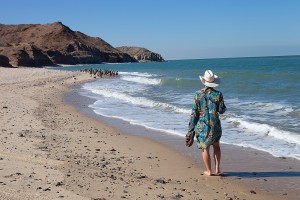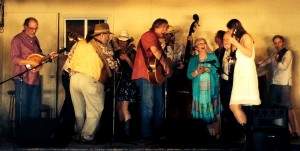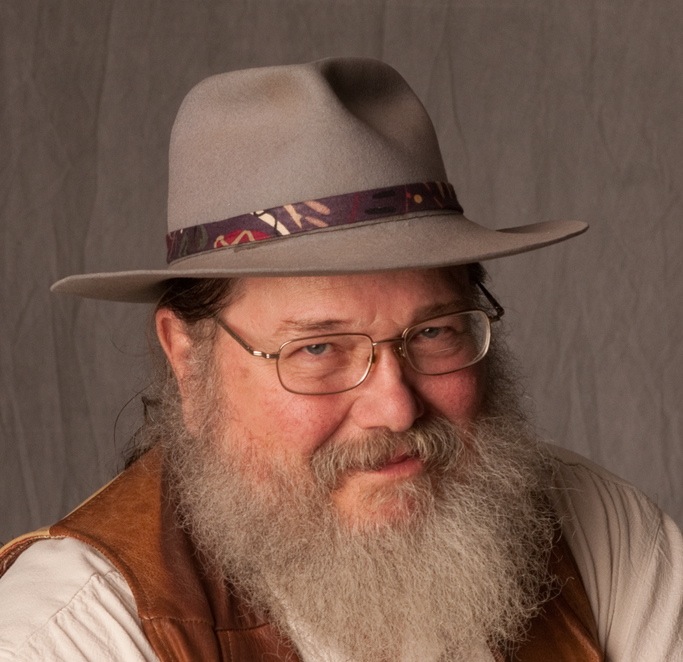“There’s a friendly tie of some sort between music and eating.”
– Thomas Hardy, Under the Greenwood Tree
 I’m doing a ride along with Emma Kate, my eldest granddaughter, as we shop for dinner supplies in sleepy San Felipe. She’s very focused on the task at hand. She has had her learner’s permit for about a week and we’ve planned some serious windshield time for our visit in Mexico.
I’m doing a ride along with Emma Kate, my eldest granddaughter, as we shop for dinner supplies in sleepy San Felipe. She’s very focused on the task at hand. She has had her learner’s permit for about a week and we’ve planned some serious windshield time for our visit in Mexico.
San Felipe has only a few traffic lights, but does an admirable job of managing traffic flow with four way stop signs. Emma is getting plenty of braking practice. She struggles a little with finding her rhythm. We drift through the barrio on sandy streets and I take note of the homes. The most substantial ones are made of concrete block covered with stucco. They sit inside walled compounds behind wrought iron gates. The loveliest homes are those constructed of the native burnt adobe block called ladrillo. Each block is colored with earthy yellows, siennas, chocolates and charcoals deposited by the straw used in the firing. The most modest houses are assembled of wooden pallets, car hoods and pieces of cardboard with tattered blue plastic tarps stretched over branches. Everything is blessed by the blood red blossoms of bougainvilleas gently touching hovel and McMansion alike and imparting redemption to all dwellers. I am blessed by family and friends awaiting us at Cantu Cove.
 At the cove we are getting prepared for the 10th San Felipe Folk Festival. It began as an excuse to get my friends to come down to my seaside home and camp for a few days and play music, drink beer and eat shrimp. Together we would put on a show in town for the ex-pat community. This year there will be about 35 adults camped at the cove. Some of the musicians have participated almost every year. I’m excited to have my old friends Nowell and Jennifer coming in from North Carolina.
At the cove we are getting prepared for the 10th San Felipe Folk Festival. It began as an excuse to get my friends to come down to my seaside home and camp for a few days and play music, drink beer and eat shrimp. Together we would put on a show in town for the ex-pat community. This year there will be about 35 adults camped at the cove. Some of the musicians have participated almost every year. I’m excited to have my old friends Nowell and Jennifer coming in from North Carolina.
My four granddaughters want to perform a song in the show and they’ve selected Merle Travis’ ‘Sixteen Tons.” I watch them work on their routine down on the beach, snapping their fingers and swaying in unison, each stepping forward in turn to sing their verse. They perform it for the group at the nightly campfire. They are excited and jockey for position. They argue over exact wording. They are charming.
The campfire has a magnetic power when the sun goes away and the desert cools. Concentric rings of heat worshipers gather around while young Noah the fire master presides with his five foot staff. He prods the coals and adds chunks of wood to maintain just the right flame and heat. Banjos, mandolins, guitars and a bass flash in the firelight, and the songs ascend to Orion and the Seven Sisters. There’s dancing in the shadows and the steady pulse of waves a few yards away.
When the little ones nod out they are carried off to their beds and the music gets a little louder. Long after I’ve hobbled off to bed, I listen to the tunes ringing out around the fire. My adult children tell me one of their favorite childhood memories of falling asleep at campouts to the sound of music being played by the fire.
At dawn, I walk the cliff edge and watch the pelicanos gathering at the water’s edge. I find Nowell and Jennifer on the porch of their cabin playing banjo and fiddle. Nowell says he bought the fiddle at Goodwill for $100 and it is about 200 years old. Nowell and I go back to my early days in West Virginia when I was a dashing young hippie guitarist and he was the WVA State Banjo Champion. The state was home to some wonderful small festivals in those days like Pipestem and Glenville, where modest crowds of young folkies and old timers gathered to share their love of Appalachian music. Success wasn’t measured in numbers or money. Families camped in newly mown fields and sat on hay bales to hear their neighbors and new friends play fiddles and banjos and there were no stars but those in the sky.
Nowell reminded me of one of our favorite events, the sweet corn festival held at an old family farm tucked neatly into a bend of the Elk River. You had to know someone to get invited. A half metal barrel filled with water was kept at a rolling boil over an outside fire and it was replenished frequently with armloads of fresh corn from the field nearby. The smoke would loop lazily over the valley and mix with the sweet sounds of singing. The old men who fiddled were fascinating to me. They would stand by the deep flowing river in a tight circle and tunes like “Shootin’ Creek” and “Cold Frosty Morning” would race around the circle followed closely by a quart mason jar filled with a clear liquid.
“Iry” Mullens was an apple of a man, short of stature with round red cheeks, bright eyes and an easy toothless smile. He carried the bona fides of his fiddling in the form of blue ribbons tied end to end and hung from the peg head of his instrument. They almost brushed the ground. His fiddle would lie along his extended left arm and he would slide his bow with an effortless shuffle that I found mesmerizing. Iry had a fondness for moonshine and it was his practice to fiddle and drink till the latter claimed him.
One moonlit night Iry fiddled and drank until he could lift his bow no longer and he lay down in the galax and jewelweed by the river. Someone placed his fiddle and bow on his chest and left him there. The fiddlers played on.
In the night a notorious prankster took a shovel of fresh offerings from the outhouse and loosening Iry’s overall straps they deposited the contents in the back of his pants. Then they buttoned him up. Iry slept on. Those who were in on the joke were watching when Iry awoke the next morning. He started to get up and then got a troubled look on his face. He dropped to all fours and crawled into the cold Elk River. He dropped his overalls and began to wash them in the rivers flow when he exclaimed loudly, “Sweetcorn! I didn’t eat any sweetcorn!”
The lasting pleasure of our little Mexican festival is not so much the smiling faces in the audience and the onstage activities but rather the campfire collaborations and the deep satisfaction of sharing music and food in a very special place with those dear to me.
Tony Norris is a working musician, storyteller and folklorist with a writing habit. He’s called Flagstaff home for 30-plus years. Visit his website at www.tonynorris.com.

